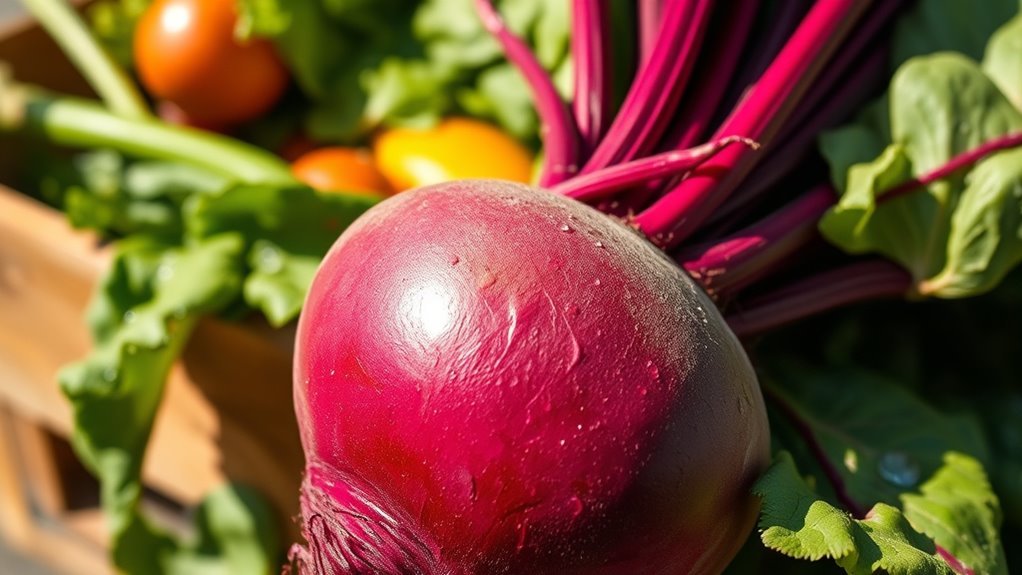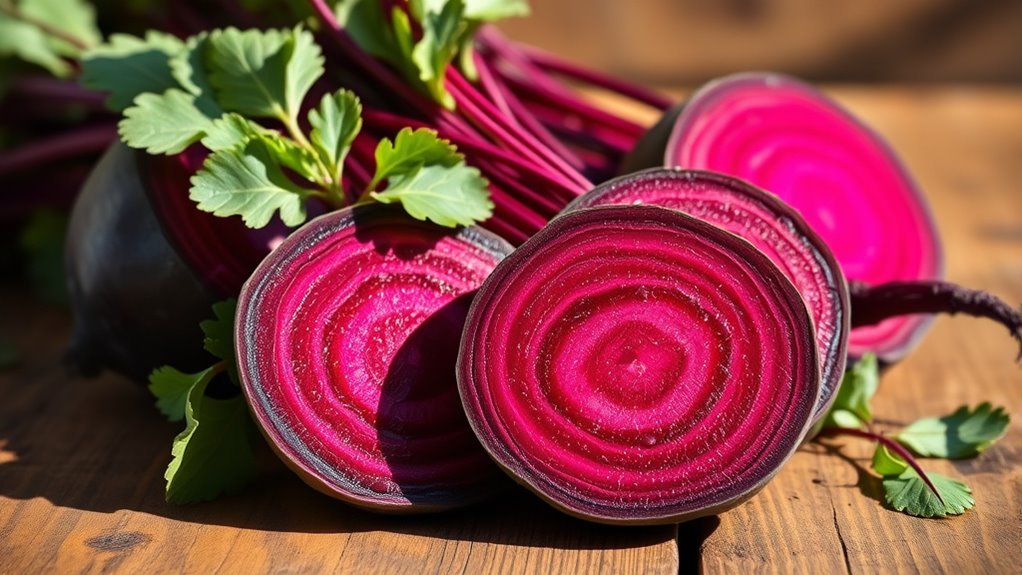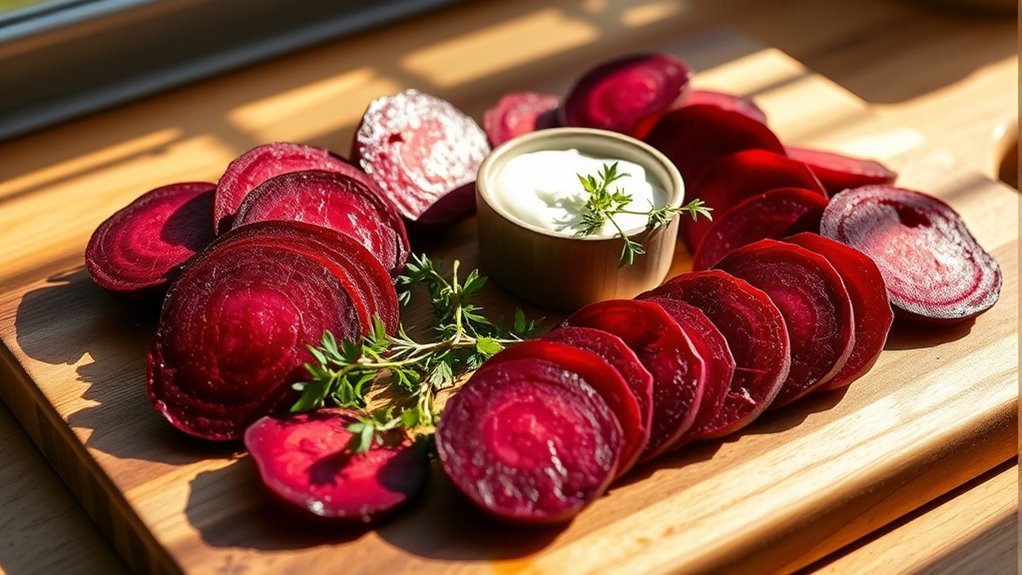Beets can be a moderate choice for a keto diet, containing about 13 grams of carbohydrates per 100 grams. While they offer essential nutrients like folate and potassium, portion control is vital to stay within your daily carb limit. Smaller varieties, like baby beets, have fewer carbs. If you’re trying to watch your carb intake, there are plenty of alternative low-carb vegetables available. You’ll find more tips and creative ways to incorporate beets into your meals ahead.
Nutritional Profile of Beets

When considering the nutritional profile of beets, it is vital to look at their key components. Beets, available in various beet varieties like red, golden, and striped, offer a range of vitamins and minerals. They’re particularly rich in folate, manganese, and potassium, contributing to overall health. The cooking methods you choose can also affect their nutritional value; steaming or roasting preserves more nutrients compared to boiling. In salads or smoothies, raw beets maintain their vibrant color and nutrient density. Incorporating these root vegetables into your diet can provide essential nutrients while satisfying your culinary creativity. So, whether you’re roasting them or adding them to a fresh juice, beets can be a delicious, healthful addition to your meals.
Carbohydrate Content in Beets

Beets contain about 13 grams of carbohydrates per 100 grams, making them a moderate source of carbs compared to other vegetables. While their beet sugar content contributes to this total, it’s important to take into account their overall nutritional value. The beet glycemic index is relatively low, typically ranging from 61 to 64, which means they won’t spike your blood sugar as much as high-GI foods. This balance can be beneficial if you’re mindful of your carb intake. If you’re looking for a nutritious option that offers fiber, vitamins, and minerals, beets can still fit into a balanced diet. Just remember to enjoy them in moderation, especially if you’re tracking your carbohydrate consumption closely.
How Beets Fit Into a Keto Diet

Although they contain more carbohydrates than many other vegetables, beets can still be incorporated into a keto diet with careful planning. By choosing specific beet varieties, like baby beets, which are smaller and have fewer carbs, you can enjoy their unique flavor without derailing your goals. You might consider limiting your portion sizes to stay within your daily carb allowance. Beet preparation methods also play a role; steaming or roasting can enhance their natural sweetness while keeping you mindful of added ingredients. Remember, it’s all about balance and moderation. As long as you plan your meals and monitor your intake, you can enjoy the vibrant taste of beets while maintaining your keto lifestyle.
Health Benefits of Beets
Incorporating beets into your diet not only adds flavor but also brings a range of health benefits. Beets are nutrient-dense, packed with vitamins and minerals like folate, potassium, and vitamin C. Drinking beet juice may enhance athletic performance by improving blood flow and reducing oxygen consumption during exercise. Additionally, beet powder can be a convenient way to boost your nutrient intake, making it easy to add to smoothies or baked goods. The antioxidants in beets may also help reduce inflammation and support heart health by lowering blood pressure. By enjoying beets in various forms, you can harness these benefits while enjoying a colorful addition to your meals. So, why not explore the versatility of beets in your culinary adventures?
Alternative Low-Carb Vegetables
If you’re looking for low-carb alternatives to beets, there are plenty of nutrient-dense options to examine. Vegetables like spinach, zucchini, and cauliflower not only fit well into a ketogenic diet, but they also provide essential vitamins and minerals. Understanding the carb counts of these substitutes can help you maintain your dietary goals while still enjoying a variety of flavors and textures.
Nutrient-Dense Options
While beets can be a colorful addition to your plate, they may not fit neatly into a strict keto diet due to their higher carbohydrate content. Fortunately, there are plenty of nutrient-dense options that can satisfy your cravings while keeping your carb intake low. Vegetables like spinach, kale, and zucchini are excellent choices; they’re packed with vitamins and minerals, offering a rich vitamin content without the added carbs. Cauliflower is another fantastic alternative, providing versatility in recipes while being low in calories. These vegetables not only support your keto goals but also contribute essential nutrients, helping you maintain overall health without sacrificing flavor. Embracing these alternatives allows you the freedom to enjoy variety in your meals while staying aligned with your dietary preferences.
Low-Carb Substitutes
With a focus on maintaining low carbohydrate intake, exploring low-carb substitutes becomes essential for those on a keto diet. If you’re looking for beet substitutes, consider vegetables like radishes, turnips, or cauliflower. These options not only provide similar textures but also fit seamlessly into low carb recipes, allowing you to enjoy flavorful meals without sacrificing your diet. Radishes, for example, can mimic the earthy taste of beets when roasted or sautéed, while cauliflower can be used in purées or salads. Incorporating these alternatives can help you stay within your carb limits while still enjoying a variety of dishes. Embrace these versatile vegetables to keep your keto journey enjoyable and sustainable.
Vegetable Carb Counts
How do you know which vegetables are truly low in carbs? When exploring alternative low-carb vegetables, it’s essential to compare their carb counts. Here’s a list of some great vegetable varieties to examine:
- Leafy greens (like spinach and kale)
- Cruciferous veggies (such as broccoli and cauliflower)
- Zucchini and yellow squash
- Bell peppers
These options not only offer lower carbohydrate content but also provide essential nutrients. By focusing on these vegetable varieties, you’ll make better carb comparisons that fit your keto lifestyle. Remember, moderation is key, and knowing the carb counts can empower you to enjoy a diverse, low-carb diet while still feeling free to choose what you eat!
Tips for Incorporating Beets Into Your Meals
If you’re looking to add beets to your meals, roasted beet salads and beet smoothies are great options. Roasting enhances their natural sweetness, making them a delicious addition to salads with greens and nuts. Alternatively, blending beets into smoothies can provide a nutrient boost while masking their earthy flavor with fruits like berries or bananas.
Roasted Beet Salad Ideas
While beets may not be the first vegetable that comes to mind for salads, their earthy sweetness and vibrant color can elevate your meals in surprising ways. Roasting beets enhances their natural flavors, making them a delightful addition to your salads. Here are some ideas to get you started:
- Combine roasted beets with goat cheese and walnuts for a rich texture.
- Toss them with arugula and a tangy vinaigrette for a revitalizing kick.
- Mix in some sliced oranges and feta for a sweet and savory contrast.
- Pair roasted beets with quinoa, adding a light lemon dressing for a nutritious boost.
Experiment with different salad dressings to discover which complements your roasted variations best. Enjoy the versatility of beets!
Beet Smoothie Recipes
Roasted beets not only shine in salads but can also bring a vibrant twist to your smoothies. You can create a delicious beet smoothie by blending roasted beets with spinach, Greek yogurt, and a splash of almond milk for a creamy texture. If you’re looking for smoothie variations, try adding frozen berries for sweetness or a scoop of protein powder for an extra boost. Beets are packed with nutrients and fiber, making them a great addition to your diet, even on keto. Just be mindful of portion sizes, as beets contain natural sugars. Experiment with different ingredients to find the perfect balance that suits your taste while enjoying the health benefits. Enjoy the freedom to create!
1. Are beets keto-friendly?
While beets are nutritious and offer health benefits, they are relatively high in carbohydrates compared to other vegetables typically consumed on a ketogenic diet. One cup of cooked beets contains approximately 13 grams of carbohydrates, which may be too high for those strictly following keto guidelines. However, if consumed in moderation and within your daily carb limits, beets can be included in a keto diet.
2. How many carbs are in beets?
A one-cup serving of cooked beets contains about 13 grams of carbohydrates, which includes around 3.8 grams of fiber. The net carbs, which are the carbohydrates that affect blood sugar levels, would be approximately 9.2 grams per cup. This amount can vary slightly depending on how the beets are prepared.
3. What are the health benefits of beets?
Beets are rich in essential nutrients, including fiber, vitamins (such as vitamin C and several B vitamins), and minerals like potassium and manganese. They are known for their antioxidant properties, which can help reduce inflammation and lower blood pressure. Additionally, beets can improve exercise performance due to their high nitrate content, which may enhance blood flow and stamina.
4. Can I eat beets on a low-carb diet?
Yes, you can eat beets on a low-carb diet, but it is important to be mindful of portion sizes. Since beets are higher in carbohydrates than many other low-carb vegetables, consuming them in smaller quantities can help you stay within your carb limits. Pairing beets with other low-carb foods can also help balance your overall carbohydrate intake.
5. What are some keto-friendly alternatives to beets?
If you are looking for keto-friendly alternatives to beets, consider vegetables that are lower in carbs such as leafy greens (spinach, kale), cauliflower, zucchini, broccoli, and asparagus. These vegetables can provide similar nutrients and fiber while keeping your carb intake within keto guidelines. Additionally, radishes can be a great substitute for beets in terms of texture and flavor without the higher carb content.
References
- https://www.healthline.com/nutrition/are-beets-keto
- https://www.ncbi.nlm.nih.gov/pmc/articles/PMC7070580/
- https://www.medicalnewsToday.com/articles/325164
- https://www.webmd.com/diet/health-benefits-beets
- https://www.spokesman.com/stories/2020/aug/18/are-beets-keto-friendly/
- https://www.verywellfit.com/are-beets-keto-friendly-5070682
- https://www.bbcgoodfood.com/howto/guide/what-are-beets
- https://www.nutrition.gov/topics/nutrition-through-life/vegetables/beets


